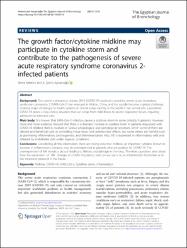| dc.contributor.author | Ketenci, Sema | |
| dc.contributor.author | Aynacıoğlu, Ahmet Şükrü | |
| dc.date.accessioned | 2022-11-01T07:26:36Z | |
| dc.date.available | 2022-11-01T07:26:36Z | |
| dc.date.issued | 2021 | en_US |
| dc.identifier.citation | Ketenci, Sema., Aynacioglu, Ahmet Şükrü., (03.10.2021). The growth factor/cytokine midkine may participate in cytokine storm and contribute to the pathogenesis of severe acute respiratory syndrome coronavirus 2-infected patients. The Egyptian Journal of Bronchology (2021). 15(1). pp.1-6. https://doi.org/10.1186/s43168-021-00087-6
| en_US |
| dc.identifier.issn | 1687-8426 | |
| dc.identifier.issn | 2314-8551 | |
| dc.identifier.uri | 10.1186/s43168-021-00087-6 | |
| dc.identifier.uri | https://hdl.handle.net/20.500.12900/86 | |
| dc.description.abstract | Background The current coronavirus disease 2019 (COVID-19) outbreak caused by severe acute respiratory syndrome coronavirus 2 (SARS-CoV-2) has emerged in Wuhan, China, and has rapidly become a global challenge, creating major challenges to health systems in almost every country in the world it has turned into a pandemic. COVID-19 poses a risky clinical situation that can range from mild illness to severe respiratory failure, requiring admission to intensive care. Main body It is known that SARS-CoV-2 infection causes a cytokine storm in some critically ill patients. However, more and more evidence showed that there is a dramatic increase in cytokine levels in patients diagnosed with COVID-19. Midkine (MK) is involved in various physiological and pathological processes, which some of them are desired and beneficial such as controlling tissue repair and antimicrobial effects, but some others are harmful such as promoting inflammation, carcinogenesis, and chemoresistance. Also, MK is expressed in inflammatory cells and released by endothelial cells under hypoxic conditions. Conclusions Considering all this information, there are strong data that midkine, an important cytokine known to increase in inflammatory diseases, may be overexpressed in patients who are positive for COVID-19. The overexpression of MK reveals a picture leading to fibrosis and damage in the lung. Therefore, questions arise about how the expression of MK changes in COVID-19 patients and can we use it as an inflammation biomarker or in the treatment protocol in the future. | en_US |
| dc.language.iso | eng | en_US |
| dc.publisher | The Egyptian Journal of Bronchology | en_US |
| dc.relation.isversionof | 10.1186/s43168-021-00087-6 | en_US |
| dc.rights | info:eu-repo/semantics/openAccess | en_US |
| dc.subject | Midkine | en_US |
| dc.subject | COVID-19 | en_US |
| dc.subject | SARS-CoV-2 | en_US |
| dc.subject | Cytokine | en_US |
| dc.subject | Storm Inflammation | en_US |
| dc.title | The Growth Factor/cytokine Midkine May Participate in Cytokine Storm and Contribute to the Pathogenesis of Severe Acute Respiratory Syndrome Coronavirus 2-infected Patient | en_US |
| dc.type | article | en_US |
| dc.department | İstanbul Atlas Üniversitesi, Tıp Fakültesi, Dahili Tıp Bilimleri Bölümü | en_US |
| dc.authorid | Sema Ketenci / 0000-0002-6695-7003 | en_US |
| dc.authorid | Ahmet Şükrü Aynacıoğlu / 0000-0001-5393-4606 | en_US |
| dc.contributor.institutionauthor | Ketenci, Sema | |
| dc.contributor.institutionauthor | Aynacıoğlu, Ahmet Şükrü | |
| dc.identifier.volume | 15 | en_US |
| dc.identifier.issue | 1 | en_US |
| dc.identifier.startpage | 1 | en_US |
| dc.identifier.endpage | 6 | en_US |
| dc.relation.publicationcategory | Makale - Uluslararası Hakemli Dergi - Kurum Öğretim Elemanı | en_US |

















